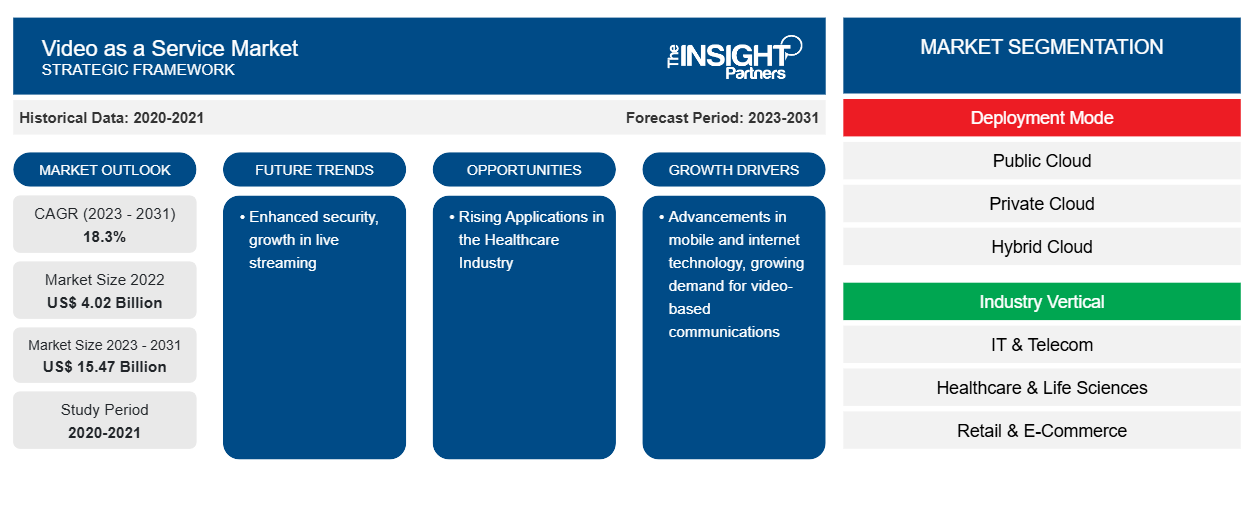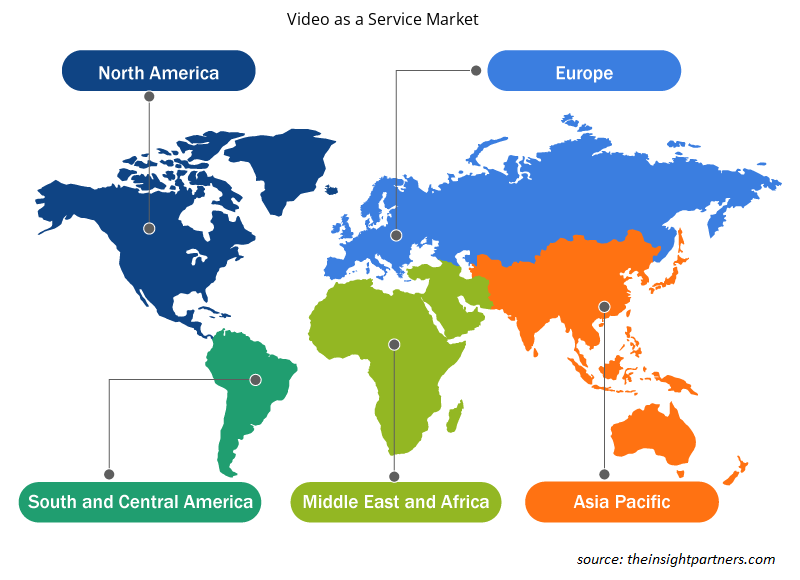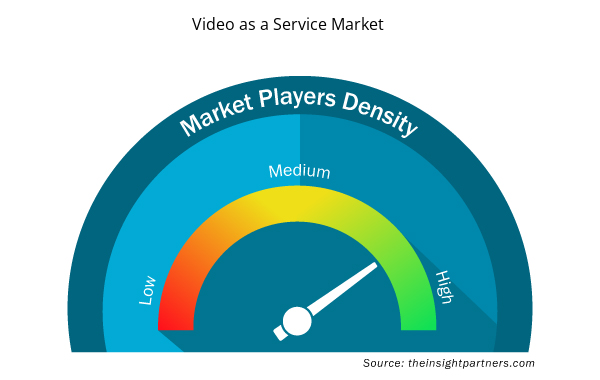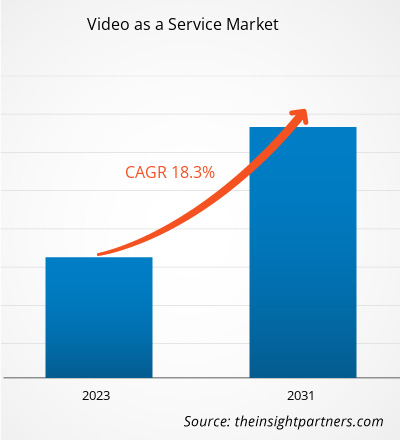The Video as a Service market size is projected to reach US$ 15.47 billion by 2030 from US$ 4.02 billion in 2022. The market is expected to register a CAGR of 18.3% during 2022–2030. Enhanced security and growth in live streaming are likely to remain a key trend in the market.
Video as a Service Market Analysis
Growing demand for video-based communications among consumers, a shift from full-time on-site work to a remote or hybrid working model, rising use of video conferencing services in the healthcare industry, increasing investments in video conferencing solutions, and growing adoption of cloud technology drive the video as a service market growth. However, growing data privacy and security concerns due to the lack of cybersecurity measures hinder the growth of video as a service market. The population in developed and developing countries increasingly adopt and implement advanced technologies in various systems. Demand for a technologically advanced video as a service is growing to enhance work efficiency and reduce infrastructure costs of business operations, which supports the growth of the video as a service market. Moreover, the rising demand for advanced technologies, including 5G, artificial intelligence (AI), augmented reality, virtual reality, and data analytics, is expected to create opportunities for the global video as a service market during the forecast period. Further, a few benefits of video as a service software, such as real-time visibility, simplified business operations, and engaging customer communication, propel the global video as a service market growth.
Video as a Service Market Overview
Video as a service (VaaS), also known as “video conferencing-as-a-service (VCaaS),” is a hosted service that allows customers to use a provider’s infrastructure for making video calls. Video call communication takes place between two individuals or more than two people and devices (multipoint) in different locations (point-to-point). The service is typically hosted in the cloud, which eliminates the need for downloading an application to use the service. VaaS allows end-user organizations to focus on their core functions by reducing the time and effort required to build and maintain their video conferencing infrastructure. This cloud-based service offers significant benefits to the users, including scalability, access to technical support, lower investment costs, and reduced need for in-house specialists, which increases the adoption among industries. Also, cost-saving benefits associated with VaaS services boost the video as a service market growth.
Customize This Report To Suit Your Requirement
You will get customization on any report - free of charge - including parts of this report, or country-level analysis, Excel Data pack, as well as avail great offers and discounts for start-ups & universities
Video as a Service Market: Strategic Insights

- Get Top Key Market Trends of this report.This FREE sample will include data analysis, ranging from market trends to estimates and forecasts.
Customize This Report To Suit Your Requirement
You will get customization on any report - free of charge - including parts of this report, or country-level analysis, Excel Data pack, as well as avail great offers and discounts for start-ups & universities
Video as a Service Market: Strategic Insights

- Get Top Key Market Trends of this report.This FREE sample will include data analysis, ranging from market trends to estimates and forecasts.
Video as a Service Market Drivers and Opportunities
Growing Demand for Video-Based Communications among Consumers to Favor the Market
Video conferencing and communication services have grown consistently in recent years. The increasing globalization of companies and the growing need for cost-effective and scalable communication solutions among consumers drive demand for video as a service software. WebinarCare data of September 2023 shows that more than 76% of individuals use video calls to work remotely. This allows employees to deliver productivity in their work by maintaining a better work-life balance. The growing use of video calls raises the demand for video as a service among consumers. Video as a service has many features, such as screen sharing, calendar scheduling, file sharing, cross-platform messaging, password protection, meeting recordings, waiting rooms, meeting reminders, and contact channels. These features support users to handle and manage daily business activities by increasing overall operational productivity and maintaining data privacy, which is fueling the demand for video as a service solution.
According to Quixy, the demand for virtual meetings grew from 48% to 77% between 2022 and 2022, which increases the demand for video as a service among consumers to streamline the collaboration between employees. This service supports individuals to increase their focus on projects or tasks assigned by their superiors. Video as a service also helps the user to effectively work and conduct a brief discussion over a video call. A rise in virtual meeting activities increases the demand for video as a service among consumers to maintain a smooth flow in their daily activities.
Rising Applications in the Healthcare Industry
VaaS has had a significant impact on the healthcare business. VaaS enables hospitals to remotely monitor patients, which is critical, especially for individuals who reside distant from healthcare facilities or after accidents in remote locations. The renal department at Lancashire Teaching Hospital in the United Kingdom, for example, uses VaaS to connect patients with nurses and physicians. Such video contact allows healthcare personnel to ensure that patients are following the proper protocols during home dialysis.
Video as a Service Market Report Segmentation Analysis
Key segments that contributed to the derivation of the video as a service market analysis are component, application, and end-user industry.
- Based on deployment mode, the video as a service market is divided into public cloud, private cloud, and hybrid cloud. The public cloud components segment held the largest share in 2022.
- Based on the industry vertical, the market is divided into IT & telecom, healthcare & life sciences, retail & e-commerce, BFSI, education, media & entertainment, government & public sector, and others.
Video as a Service Market Share Analysis by Geography
The geographic scope of the video as a service market report is mainly divided into five regions: North America, Asia Pacific, Europe, Middle East & Africa, and South & Central America.
North America dominated the Video as a Service market share in 2022. The region contributes a noteworthy share to the global video as a service market owing to high adoption and investments in cloud technology and a growing number of industries in the region. Video as a service allows organizations to conduct remote video meetings by fostering collaboration among partners and team members from different locations. The video as a service market in North America is anticipated to expand in the future owing to the presence of a large number of well-established players such as Cisco Systems, Inc.; Zoom Video Communications, Inc.; Microsoft; Google; Adobe; and others. The market players continuously develop and expand their service portfolio to attract new customers. In October 2023, Zoom Video Communications, Inc. partnered with Swoogo to modernize hybrid events by bringing larger and more engaged audiences. Through this partnership, both companies are integrating their technology into a virtual platform that focuses on engagement and high-quality production and scale. The integration can support customers to use Zoom Events or Swoogo for sharing video data between platforms and is expected to be commercially available in early 2024. Market players operating in the region are raising awareness about the benefits provided by video as a service to SMEs, which fuels the video as a service market growth in the region. Moreover, the growing adoption of video conferencing and other cloud-based communication services drives the video as a service market in North America. In addition, the demand for high-quality internet and continuous access to visual meetings among organizations contributes to the regional growth of video as a service market.
Video as a Service Market Regional Insights
The regional trends and factors influencing the Video as a Service Market throughout the forecast period have been thoroughly explained by the analysts at Insight Partners. This section also discusses Video as a Service Market segments and geography across North America, Europe, Asia Pacific, Middle East and Africa, and South and Central America.

- Get the Regional Specific Data for Video as a Service Market
Video as a Service Market Report Scope
| Report Attribute | Details |
|---|---|
| Market size in 2022 | US$ 4.02 Billion |
| Market Size by 2030 | US$ 15.47 Billion |
| Global CAGR (2023 - 2031) | 18.3% |
| Historical Data | 2020-2021 |
| Forecast period | 2023-2031 |
| Segments Covered |
By Deployment Mode
|
| Regions and Countries Covered | North America
|
| Market leaders and key company profiles |
Video as a Service Market Players Density: Understanding Its Impact on Business Dynamics
The Video as a Service Market market is growing rapidly, driven by increasing end-user demand due to factors such as evolving consumer preferences, technological advancements, and greater awareness of the product's benefits. As demand rises, businesses are expanding their offerings, innovating to meet consumer needs, and capitalizing on emerging trends, which further fuels market growth.
Market players density refers to the distribution of firms or companies operating within a particular market or industry. It indicates how many competitors (market players) are present in a given market space relative to its size or total market value.
Major Companies operating in the Video as a Service Market are:
- Cisco Systems Inc
- Zoom Video Communications Inc
- Microsoft Corp
- Amazon Web Services Inc
- Avaya Holdings Corp
- Google LLC
Disclaimer: The companies listed above are not ranked in any particular order.

- Get the Video as a Service Market top key players overview
Video as a Service Market News and Recent Developments
The video as a service market is evaluated by gathering qualitative and quantitative data post primary and secondary research, which includes important corporate publications, association data, and databases. A few of the developments in the video as a service market are listed below:
- Sony Electronics Inc. announced that Zoom Video Communications Inc. will be coming to BRAVIA TVs, compatible with BRAVIA CAM1. This partnership will allow users to easily connect with family, friends, and colleagues through video calls and meetings from the comfort of their living room. Sony's BRAVIA is the first TV brand to support the Zoom for TV app on Google Play Store. (Source: Sony Electronics Inc., Press Release, June 2023)
- Adobe introduced the industry-first innovation Premiere Pro to its family of video applications, and Premiere Pro involves AI-powered text-based video editing and automated color tone-mapping capabilities with GPU acceleration and dozens of workflow enhancements that make it the fastest version of Premiere Pro ever released. The company also celebrating 30 years of After Effects, the world’s most popular motion design software for video professionals, with consistent color support, adding a context-sensitive Properties Panel for enhanced user productivity and performance optimizations. (Source: Adobe, Press Release, April 2023)
Video as a Service Market Report Coverage and Deliverables
The “Video as a Service Market Size and Forecast (2020–2030)” report provides a detailed analysis of the market covering below areas:
- Video as a service market size and forecast at global, regional, and country levels for all the key market segments covered under the scope
- Video as a service market trends, as well as market dynamics such as drivers, restraints, and key opportunities
- Detailed PEST/Porter’s Five Forces and SWOT analysis
- Video as a service market analysis covering key market trends, global and regional framework, major players, regulations, and recent market developments
- Industry landscape and competition analysis covering market concentration, heat map analysis, prominent players, and recent developments for the video as a service market
- Detailed company profiles
- Historical Analysis (2 Years), Base Year, Forecast (7 Years) with CAGR
- PEST and SWOT Analysis
- Market Size Value / Volume - Global, Regional, Country
- Industry and Competitive Landscape
- Excel Dataset



Report Coverage
Revenue forecast, Company Analysis, Industry landscape, Growth factors, and Trends

Segment Covered
Deployment Mode, and Industry Vertical

Regional Scope
North America, Europe, Asia Pacific, Middle East & Africa, South & Central America

Country Scope
This text is related
to country scope.
Frequently Asked Questions
The video as a service market size is projected to reach US$ 15.47 billion by 2030
The video as a service market is expected to register a CAGR of 18.3% during 2022–2030
Enhanced security and growth in live streaming are likely to remain key trends in the market.
Cisco Systems Inc, Zoom Video Communications Inc, Microsoft Corp, Amazon Web Services Inc, Avaya Holdings Corp, Google LLC, Adobe Inc, RingCentral Inc, Dekom AG, and BlueJeans are among the leading payers operating in the video as a service market.
North America dominated the video as a service market in 2022.
Advancements in mobile and internet technology and growing demand for video-based communications among consumers are expected to drive the video as a service market.
Trends and growth analysis reports related to Technology, Media and Telecommunications : READ MORE..
The List of Companies – Video as a Service Market
- Cisco Systems, Inc.
- Zoom Video Communications, Inc.
- Microsoft Corp
- Amazon Web Services Inc.
- BlueJeans by Verizon
- Avaya Holdings Corp
- Google LLC.
- RingCentral Inc.
- Adobe Inc.
- DEKOM AG

 Get Free Sample For
Get Free Sample For